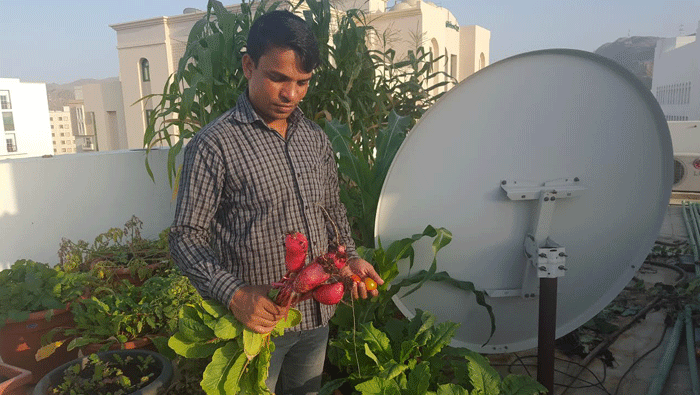
Muscat: Not many living in Muscat would imagine growing veggies in their balcony or on the rooftop; it’s like a distant dream.However, one such successful attempt was made by a biotechnology professor living in Oman.
Dr. Zulfikar Ali is a professor of Biotechnology and Botany from a prominent university in India, and enjoys growing plants, a hobby he pursues wherever he goes. When he came to Oman in 2009 to supervise a study centre, he did just that.
**media[614165]**
“I love being around plants and greenery, it refreshes the surroundings. So when I got here, I looked around and saw a lot of date palm trees, something very obvious because it is a desert. So when I thought of growing plants at my place, I was almost certain that I wouldn’t be able to go beyond cacti and other such hardy plants. However, reality was different.”
He found that many efforts at beautification had been made by growing brightly coloured flowers along the roadside, date palms and neem trees, “I realized that the government had put in a lot of effort and was also very impressed with the Falaj irrigation procedure.”
He later read that Oman was importing vegetables from Jordan, India and other countries. “When I read that, the word ‘import’ struck me. I wondered why can’t Oman be independent and grow this at home, why do they need to import?”
**media[614164]**
After looking around, Dr. Ali decided to invest in a kitchen garden at his place, for which he used local soil and PittMoss to retain water in the soil. However, that attempt failed as he noticed that the plants were dying. He tried once more in 2013, and failed again.
“After investing about OMR1,000 year and seeing no results, I grew frustrated and decided to seek opinion of others. I went to India and spoke to professors at agriculture colleges.Theirsimple explanation for the failed attempt was that Oman was a desert.
“I then bought books off Amazon and read them, and in 2014, went around visiting farms in Oman and took up the challenge. Also, at the same time, I observed that Salalah has a lot of coconut trees and an abundance of coconut fibre from which Coco Peat is produced.
“I then conducted an experiment where I used very little PittMoss for water retention, loads of Coco Peat and some manure. I used seeds brought from Rajasthan, Bihar and Delhi in India. This was in 2015 and the results were astonishing. Look around my garden today, and you will find turnips, radish, capsicum, eggplant, corn, carrots and more coming up. All this is organic without the use of any pesticides at all.
He has grown vegetables all over the building he lives in – on the rooftop, on open spaces, in the balcony and on the stairs.
Dr. Ali also grew tomatoes through hydroponics, a soilless culture of farming where the roots of the plant are in water which brings no soil borne diseases to the plant, the results for which were also amazing.
“Oman is at a stage where it is diversifying its economy and this is such a brilliant way of doing that. I hope that one day, Oman will export these vegetable out to other countries. All that is needed is enthusiasm.”